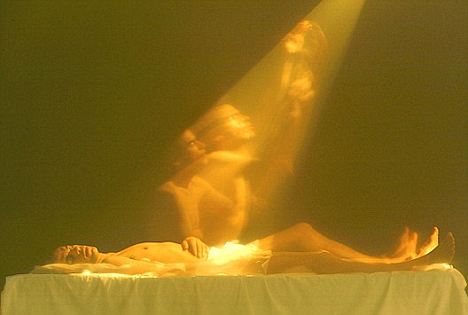Posted by Richard Rawlinson
Scientists have observed that when Near Death Experiences (NDEs) are occurring the pineal gland releases DMT, a powerful hallucinogen. DMT is produced at night and small amounts are secreted as you dream. When you die, a large amount is secreted. Many say this is the cause for these NDEs, mere hallucinations and nothing more. But why is DMT produced, and why at the time of death? Could it be acting as a bridge between our physical existence and other dimensions of the spiritual world?
Scientists are dragging their heels on clinically testing this phenomena, even though we have the technology to invent machines sensitive enough to register consciousness outside matter. If governments fund scientists with billions of pounds to devise the Hadron Collider to discover how matter forms at a subatomic level, they can surely help investigate life after death, too? If astrophysicists and nuclear physicists invent devices that can ‘see’ the invisible, why not try harder to prove life after death?
Could atheism be a reason? A Gallup poll on immortality found only 16% of scientists believed in life after death as opposed over 60% of the general population. Infinite parallel universes, fine. Afterlife, too crazy.
Any NDE research is invariably modestly funded by the private sector and conducted by medical professors and the softer science practitioners such as psychologists. Yet a crucial point for any argument for a non-material dimension of the dead is the astrophysics claims that 95.4% of the universe is made up of mysterious dark matter and dark energy, not the matter and energy we call ‘real.’ Our bodies are barely physical at all when the ratio of the amount of matter in an atom to the total size of an atom is roughly that of a pea to a football field. The rest is energy in the form of forces.
Even among physicists, there’s rarely true objectivity. They invariably deal in a set of effects rather than fact. If this and that are observed to happen, why they happen is deduced. They don’t really know for sure, for instance, if there was ever a Big Bang. That’s why the Hadron Collider was built, to attempt reproduction of how matter was born.
So why not rely on soft-science clinical tests on the continuation of organised consciousness outside of matter? An intriguing thing about NDEs is the similarity of recorded accounts among people of different religious backgrounds and cultures: a strong feeling of oneness; not wanting to come back; being able to see their dead/dying body; brilliant white lights; glimpses of life flashing before their eyes. If people with different minds are having a hallucinatory experience, why so similar?
Then there’s the NDE of a woman, born blind. After a car crash, she reported being able to see herself lying in hospital, and was inexplicably able to describe specific details about the people who attended to her. She found herself seeing light, colours and shapes, even though these concepts are impossible to describe to a blind person. She ‘woke up’ with knowledge that she could not possibly possess.



Excellent Beyond Belief discussion about NDEs recently – with some intriguing conclusions. The podcast is here: http://downloads.bbc.co.uk/podcasts/radio4/belief/rss.xml
I can heartily recommend “The Fine Art Of Dying” by Fenwick(s), as recommended to me by Charles. Very interesting read.
So can I, Lol; in fact the reports of NDEs come so thick and fast, and so similar and so convincing that I gave up bothering to read them in the end, and just read the enlightening comments in between. The god clearly isn’t a scientist, any more than it’s a humanoid. Scientists are just as superstitious as the rest of us, when you examine why they choose to believe in science in the first place with so little evidence for an objective reality besides subjective experience. Life’s too short to try and ‘explain’ it anyway while there’s all this… Read more »
I looked into NDEs as part of my MA (among other things). Scientists have many theories, many of which seem plausible, but there is always a case that won’t fit. I have to say, DMT is a new one on me…I’d be very interested to see that evidence. I think there is a 6 year investigation ongoing at the moment involving English and Dutch hospitals. It may have finished by now, but it certainly hasn’t been published! I think Sam Parnia was the driving force. A friend of mine, Penny Sartori did her doctoral research on the veridity of NDEs… Read more »